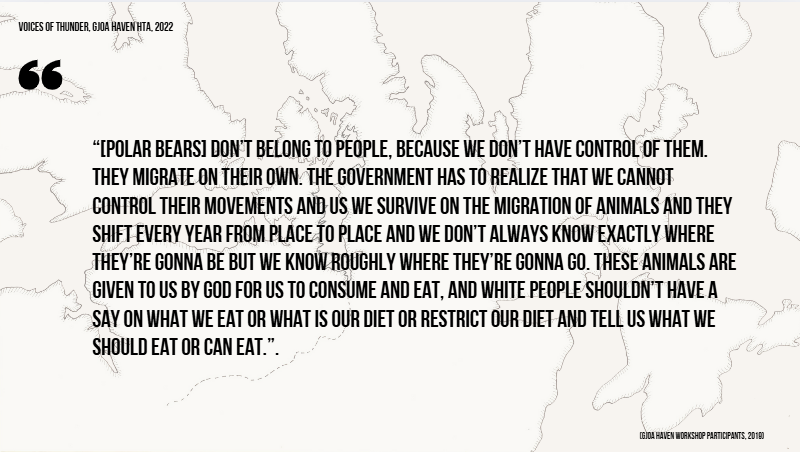Knowledge co-production in BearWatch
To this purpose, BearWatch researchers have collected and analysed TEK through workshops and individual interviews, coupled with participatory mapping. This focus on documenting and compiling TEK, rather than the more complex endeavour of engaging with Inuit Quajimajatuqangit (IQ) and reconciling two different systems of knowing and being as part of reconciliatory approaches to research, fits within a convention of western science, to selectively incorporate those elements of Inuit knowledge that can be processed and measured as ‘data’ (Agrawal, 2002; Nadasty, 1999). Such ‘data’ is often, as was the case within the Bearwatch project, translated into geographical polygons and markers on a map. Among other goals, such mapping had the objective of guiding future on-the-land field sampling.
Underlying this approach was an assumption that knowledge integration is a “technical problem”.In such technical approaches, knowledge integration is approached as the challenge of integrating two compartmentalised bodies of knowledge consisting of codifiable data, to be solved by applying the most appropriate interface (see Nadady, 1999). Such a view leads to Indigenous knowledge being seen as simply a new form of "data" - to be incorporated into research and existing management bureaucracies. The choices that were made within the project as part of this desire to ‘integrate’ TEK into western-based sciences and the subsequent processes of analysing the gathered knowledge, have led to the disconnection of such TEK from IQ - and has therefore lost the distinguishable characteristics that would make this TEK, “traditionally” Inuit.
This observation is not to discount the insights, observations, and contributions to research that such knowledge can provide for monitoring research. However, as a process of meaningfully engaging with Inuit knowledge on its own terms, beyond a data-driven focus, this narrow focus on TEK falls short. Instead of approaching knowledge conciliation as a question of data, Indigenous knowledge should be considered as an invitation to rethink the basic assumptions, values, and practices underlying contemporary processes of research and polar bear management. Many Indigenous people, for example, share an understanding of knowledge not as simply understanding relationships within Creation, but rather as Creation itself (McGregor 2004). Knowledge is something one does.

